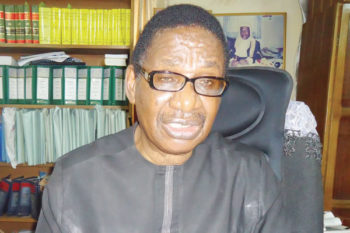
The Chairman of the Presidential Advisory Committee Against Corruption (PACAC), Prof. Itse Sagay, on Monday said a study has shown that 55 top Nigeria government officials and private businessmen illicitly diverted a total of N1.35 trillion between 2006 and 2013.
He also said at least one trillion naira was lost to fuel subsidy scam in the country and millions of dollars stolen by an ex-minister from the Nigerian National Petroleum Corporation (NNPC) coffers to bribe election officials in 2015.
Sagay spoke at the old Banquet Hall of the State House, Abuja, during the Conference on Promoting International Cooperation in Combating Illicit Financial Flow and Enhancing Asset Recovery to Foster Sustainable Development.
He said, “A study revealed that between 2006 and 2013, 55 top government officials and private businessmen illicitly diverted a total of N1.35 trillion roughly at that time $7.5 billion to themselves at the expense of ordinary Nigerian citizens. This was what was revealed. What was not revealed turned out to be far more mind boggling.
“These included trillions of naira squandered in fuel subsidy scam, billions of naira in Dasukigate and hundreds of millions of dollars taken from the NNPC by a former minister to bribe election officials in 2015. The list goes on.”
According to him, one-third of the stolen money could have been devoted to several relevant projects in the country.
He said because of the looting, Nigeria has the largest number of abandoned projects in the world.
Sagay said government officials were more interested in sharing projects funds for their selfish benefits than completing projects.
“In the press release of January 2016 on the negative impact of looting, government provided the following insight: One third of stolen funds could have provided 600.18 kilometers of road and 36 ultramodern hospitals per state. The funds would have provided education for children from primary to tertiary level at the rate of N5.34 billion per child and 20,062 units of two-bedroom houses. The amount stolen would have done all these.
“As I was putting my thought to paper on Thursday, June 1, a newspaper headline kept screaming at me: N423 billion Niger Delta projects misappropriated by the Ministry of Niger Delta.
“So you can see that the corruption onslaught is devastating and unrelenting thus driving us further and further from our sustainable development goals.
“I have always said it and you know Nigerians don’t like the truth, but this is the truth, give our elites an opportunity to do a project, vote money for that project, the first thing they do is divide that money amongst themselves.
“Nigeria has largest number of uncompleted projects in this world. Many people just take the money and walk away in collusion with the Ministries, Departments and Agencies (MDAs) that awarded the contracts.
“Let me draw the connect between unrestrained looting and illicit financial flows. Most of the financial assets stolen in Nigeria are taken out of the country as part of the illicit financial flow. The immediate impact is that Nigeria is deprived of the capacity to realize its sustainable development goals of the UN officially known as transforming our world.
“These include no poverty (eradication of poverty), zero hunger (eradication of hunger), good health, quality education, clean water and sanitation and affordable clean energy etc.
“It is hard for any country to achieve that when it has looted 90 per cent of its resources and this hemorrhage is leaving our shores of under-developed world to the developed world, developing them more while we are retarding.
“The annual flow of criminal activities is estimated at between $1 and $1.6 trillion and half of this comes from developing countries like ours.
“It is therefore vital that we increase our capacity of understanding the illicit financial flows, the hemorrhage if we are to meet our sustainable goals or if we are ever to transform something better. We have to acquire the capacity to stop the hemorrhage,” the PACAC chairman added.
Copyright Ships & Ports Ltd. Permission to use quotations from this article is granted subject to appropriate credit given to www.shipsandports.com.ng as the source.
